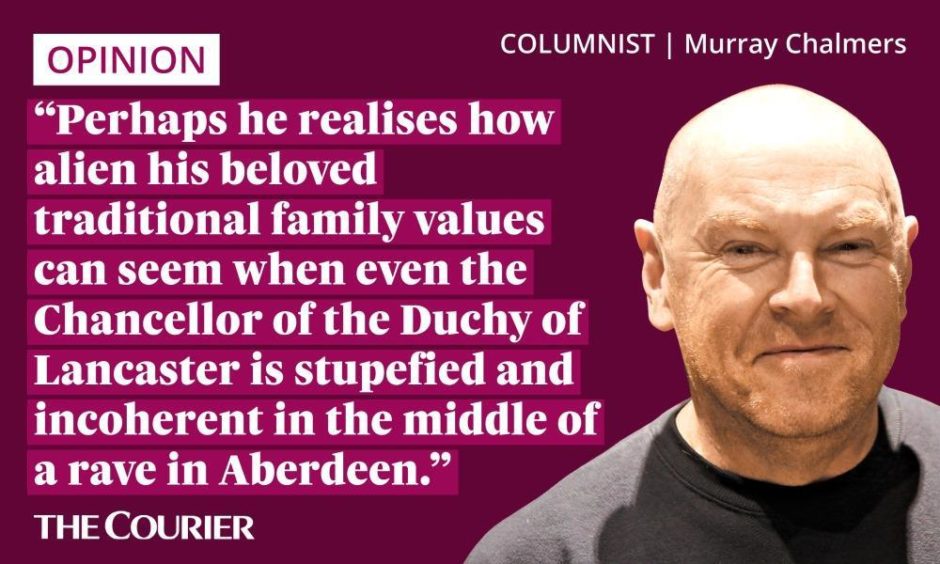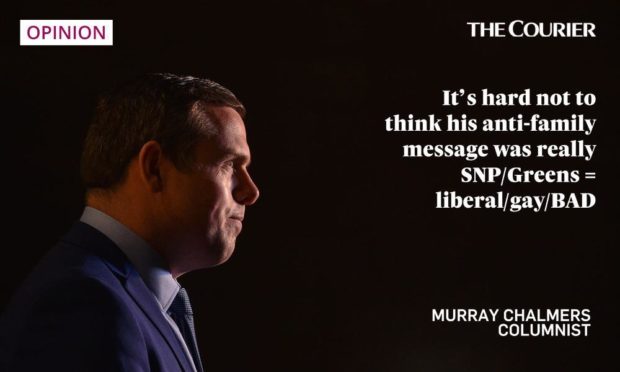I tweeted Douglas Ross last week in response to his claim that the SNP/Greens alliance was somehow “anti- families”.
I wanted the leader of the Scottish Tories to explain what he means by the term – and what he thinks about homosexuality?
That he didn’t reply is no surprise.
When faced with potentially difficult questions, it’s not that Ross doth protest too much, it’s that he often doesn’t really protest at all.
While the Scottish Tories huddle protectively around their leader like they’re guarding a sick lamb, Douglas Ross tends to go quiet when he makes a gaffe.

And such instances are frequent, happening so often that even his fans must be running out of excuses.
Sadly, when he does disappear from view it’s not like the virtuous silence of a Gandhi or a Carthusian monk.
He’s more of an eternal Kevin the Teenager, sulking because he’s been sussed by the grown-ups.
@Douglas4Moray what does “anti family” actually mean? You’re not the brightest button in the box are you? What are your views on homosexuality? Come on, do tell!
— murray chalmers (@murraychalmers) August 21, 2021
Maybe he’s fervently counting the days until he’s freed again to exact an embittered revenge upon the nasty Nats and Nics who keep tripping him up with absolutes like facts, logic and progression.
Stunned into silence by Michael Gove’s moves?
Or maybe Douglas Ross was busy researching suitably family orientated Aberdeen nightclubs for Michael Gove, now spectacularly footloose (did you SEE those moves?) and fancy- free.
Gove looked so free to be who he wants to be it was hard not to view his state as an allegory for Tory Brexit Britain – alone, broken, deluded and a figure of fun for those watching in disbelief and horror.
Gove was keeping it so wonderfully real the gave the hilarious impression of someone completely, fantastically wasted.
Once more, Douglas Ross kept strangely quiet about this incident.
Perhaps he realises how alien his beloved traditional family values can seem when even the Chancellor of the Duchy of Lancaster is stupefied and incoherent in the middle of a rave in Aberdeen.
Of course, Ross has form on the subject of hypocrisy and the art of the swift volte-face; like many of his kind both personality defects are very much part of his DNA.
Douglas Ross and the tactics of the playground
We’ve all met his sort before, most markedly in the school playground where they delighted in name-calling and antagonising anyone who they deemed different or a threat.
They were the ones causing just enough trouble to ignite a fight before running off to the safety of their bunkers to plot their next intimidatory move.
Not for nothing does he remind me of Gripper Stebson from the classic 1980s TV series Grange Hill.
Back in the day we used to call these people bullies; now we just call them party officials.
However, this is a party many of us aren’t invited to, especially if you don’t conform to Ross’s heteronormative ciphers.
And I have to say I’m so, so tired of it.
Earlier this year it was revealed that Ross would have voted against gay marriage in 2014, had he been an MSP.
He cited the mythical “hundreds of thousands of people who oppose this legislation” – as if this fictional people-pleasing made it ok anyway.
In 2019 he voted against an amendment to legalise same sex marriage and abortion in Northern Ireland.
In June this year Ross shamelessly wore a rainbow pin during First Minister’s Questions.
Like many heteronormative men, I guess he just doesn’t understand irony.
Douglas Ross words linked to real life harms
However, Douglas Ross might like to know the consequences of making remarks which somehow link liberal policies of acceptance and equality (the SNP and Greens) with being “anti- family”.
Since 2015 hate crimes related to sexual orientation and gender identity have increased year on year.
The Guardian headline on this report says a “spate of attacks across the UK sparks fear among the LGBTQ+ community”.
They’re not wrong.
It's #ComingOutDay! I came out as gay at 18, and my Mum laughed and said "Did you think we didn't know already?" Felt like an anticlimax at the time, but I know I was lucky to be instantly accepted.
— Patrick Harvie 🇪🇺🌈 (@patrickharvie) October 11, 2019
In the year to March 2020 in England and Wales sexual orientation hate crimes rose by 19%.
Transgender identity hate crimes rose by 16%.
There is a strong feeling that freedoms won after decades of struggle are now being eroded. That the streets are no longer safe for anyone who dares to be different.
Women, of course, have felt this for years.
His words were well chosen. Apparently anti-gay sentiments appeal to some of his heartland followers.
And with them Douglas Ross yet again showed a malevolent, spiteful, destructive side to his character.
This is a man who would do anything to score even a pyrrhic victory against his political opponents.
It’s hard not to think his anti-family message was really ‘SNP/Greens = liberal/gay/BAD’.
Perhaps there is some gloating in the knowledge that Greens co-leader Patrick Harvie is bisexual.
If this toxicity and divisiveness is an example of Ross’s much vaunted family values is it any wonder that so many of us who don’t conform to his antiquated viewpoint would wish to live in a greener, fairer more tolerant society?
A society filled with hope and not playground hate.










